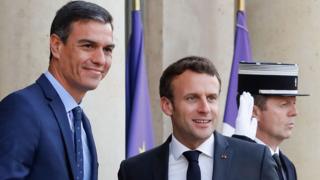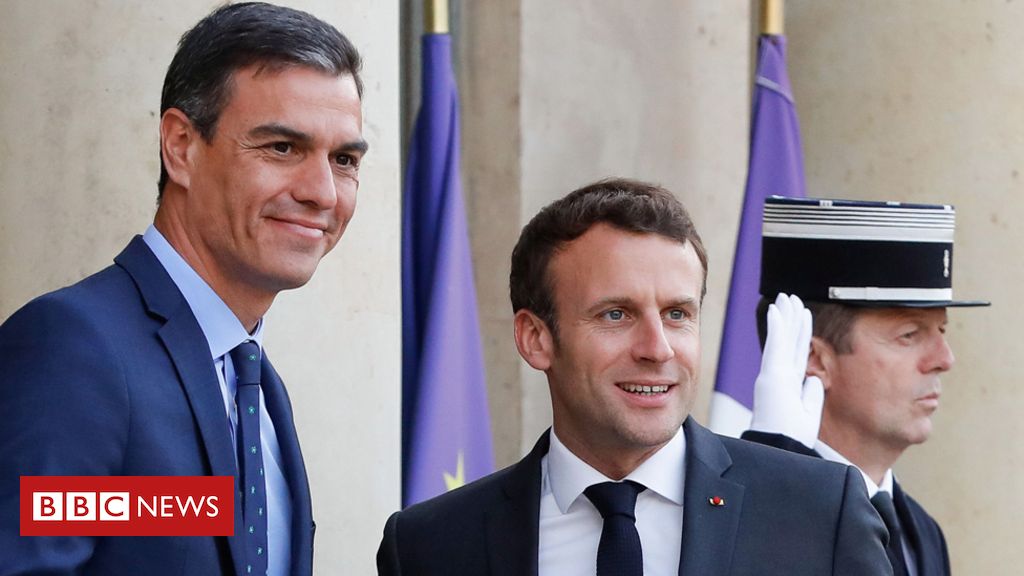 Image copyright
Image copyright
AFP
President Macron (C) hosted Spain’s socialist PM Pedro Sánchez in Paris on Monday
EU leaders are heading to Brussels to assess the post-election political landscape and consider rival candidates for the EU’s top jobs.
The haggling over jobs – including a replacement for EU Commission President Jean-Claude Juncker – is likely to last several months.
The UK is involved in the discussions.
For the first time the big centrist blocs no longer have a majority. The European Parliament elections boosted nationalists, the Greens and liberals.
It leaves the EU more fragmented, so finding consensus may be harder than in the past.
The talks over dinner on Tuesday may not even result in a shortlist of candidates.
It is more an occasion for leaders to assess the political mood and explore possible combinations, to ensure a stable balance of political opinions, geography and gender.
UK Prime Minister Theresa May will participate, but Brussels sources say there will be little or no discussion of Brexit.
Who will get the most coveted post?
The other top EU officials to be replaced later this year are: European Council President Donald Tusk (Polish); European Central Bank President Mario Draghi (Italian) and EU High Representative for Foreign Affairs Federica Mogherini (Italian).
After lengthy negotiations, the new top officials will take up their posts on 1 November, except for the new European Council chief, who starts on 1 December.
French President Emmanuel Macron – a liberal – met Spain’s socialist Prime Minister Pedro Sánchez in Paris on Monday. Mr Macron wants his En Marche movement (LREM) to be at the heart of a new centrist alliance in Europe.
In 2014 Mr Juncker was chosen to head the Commission as the centre-right European People’s Party (EPP) candidate, after the EPP had won the election.
But it is a much tougher challenge this time for the EPP’s candidate Manfred Weber – a German – after his bloc shrank from 217 seats to 180 in the 751-seat parliament. He has the backing of German Chancellor Angela Merkel.
Party leaders are also meeting in Brussels in an effort to agree on a “Spitzenkandidat” – lead candidate – for Mr Juncker’s job. The Commission enforces EU rules and drafts EU laws, so it is the most coveted post in the 28-nation bloc.
Mr Juncker, an EU veteran and ex-Prime Minister of Luxembourg, won in 2014 despite opposition from the UK and Hungary.
But Mr Macron and some other EU leaders are sceptical about the Spitzenkandidat process. The final choices for the top posts still have to be approved by the European Parliament.
Many nationalists and Eurosceptics – still a minority in the parliament – reject the process, seeing it as an establishment stitch-up.
Mr Weber’s rivals include centre-left candidate Frans Timmermans, from the Netherlands, and liberal candidate Margrethe Vestager, from Denmark.
Because of the new clout of liberals and Greens, Ms Vestager – famous for legal battles with US tech giants – might be seen as a compromise candidate.
Countdown to EU top jobs:
- May-June: Consultations between EU leaders and parliamentary groups
- 20-21 June: European Council decisions
- July: European Parliament votes on nominee for Commission president
- 1 November: New Commission president takes office, along with new High Representative and ECB president
- 1 December: New European Council President takes office
